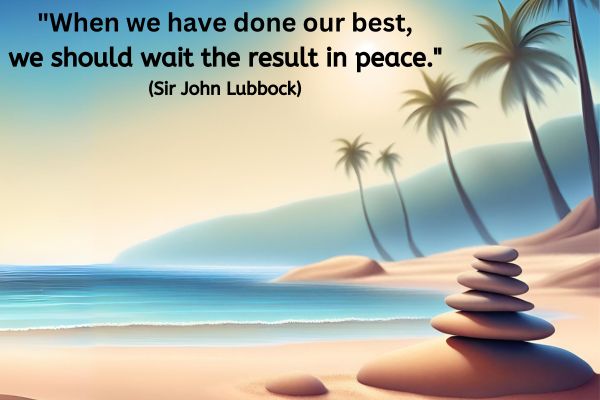
Happy Sunday! Today’s quote is:
“When we have done our best, we should wait the result in peace.” (Sir John Lubbock)
In whats often reffered to as a fast-paced world, where instant gratification often reigns supreme, the concept of waiting for results in peace may seem counterintuitive. However, if you coach from an inside out perspective, Sir John Lubbock’s words offer invaluable insights into the power of patience and trust in the coaching journey.
As coaches, our role is to guide and support our clients as they navigate their personal and professional challenges. We may offer strategies, insights, and encouragement to help them achieve their goals and aspirations. Yet, despite our best efforts, there comes a point where we must relinquish control and allow the process to unfold naturally.
This quote serves as a poignant reminder that after exerting our utmost effort, we must entrust the process and await the outcome with a sense of peace. It doesn’t entail passive inaction or idleness; rather, it entails seeking inner calm and serenity, acknowledging that we’ve fulfilled our part and allowing the universe to unfold as it should.
It’s important to note that this doesn’t imply a stagnation of personal growth or development; it simply means recognising that we’ve given our best in the present moment. It doesn’t mean you can never improve your skills or understanding further to make quicker and greater impact. It’s about honoring your current best without feeling constrained by it indefinitely
This concept aligns with the understanding that our experience of reality is created from the inside-out. Our thoughts, beliefs, and perceptions shape our reality, and when we’re able to cultivate a sense of peace within ourselves, we invite that peace to permeate our external circumstances.
So how can we, as coaches, embody this principle in our practice?
First and foremost, it’s about cultivating a deep sense of trust in the coaching process. Trust that our clients have the innate wisdom and resilience to navigate their challenges. Trust that the insights and breakthroughs will emerge in their own time. And trust that, as coaches, we are merely facilitators in their journey towards growth and self-discovery – it’s not our job to produce answers ourselves.
Secondly, it’s about embracing patience as a guiding principle in our coaching practice. Instead of rushing to find solutions or fix problems, we can create space for our clients to explore, reflect, and uncover their own answers. This requires us to resist the urge to intervene or provide immediate solutions and instead allow our clients the freedom to discover their own truth.
Finally, it’s about embodying a sense of peace and presence in our coaching interactions. When we approach our work with a calm and grounded presence, we create a safe and supportive environment for our clients to explore their thoughts and feelings without judgment or pressure. This sense of peace not only benefits our clients by fostering deeper connections and trust, but as an added bonus it also transforms outcomes for us as coaches. By embodying peace, we may notice a positive difference in our own perspective and the overall coaching experience.
In conclusion, Sir John Lubbock’s quote reminds us that as coaches, our role is not to control or dictate outcomes but rather to trust in the inherent wisdom of the coaching process. By embracing patience, trust, and peace in our practice, we can create profound opportunities for growth, transformation, and self-discovery for ourselves and our clients alike.
About Jen Waller

Jen Waller is on a mission to support, nurture and encourage coaching skills and talents from non-coach to coach and beyond.
As an experienced coach and trainer Jen is happy to utilise all skills at her disposal to assist clients from getting out of their own way and making a difference in the world with their coaching. Find out more about the support Jen offers here.